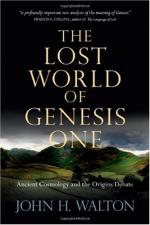|
This section contains 897 words (approx. 3 pages at 300 words per page) |

|
Cosmology is the study of the origin, structure and evolution of the universe.
The origins of cosmology predate the human written record. The earliest civilizations constructed elaborate myths and folk tales to explain the wanderings of the Sun, Moon, and stars through the heavens. Ancient Egyptians tied their religious beliefs to celestial objects and Ancient Greek and Roman philosophers debated the composition and shape of the Earth and the Cosmos. For more than 13 centuries, until the Scientific Revolution of the sixteenth and seventeenth centuries, the Greek astronomer Ptolemy's model of an Earth-centered Cosmos composed of concentric crystalline spheres dominated the Western intellectual tradition.
Polish astronomer Nicolaus Copernicus' (1473–1543) reassertion of the once discarded heliocentric (Sun-centered) theory sparked a revival of cosmological thought and work among the astronomers of the time. The advances in empiricism during the early part of the Scientific Revolution, embraced and embodied in the careful observations...
|
This section contains 897 words (approx. 3 pages at 300 words per page) |

|


